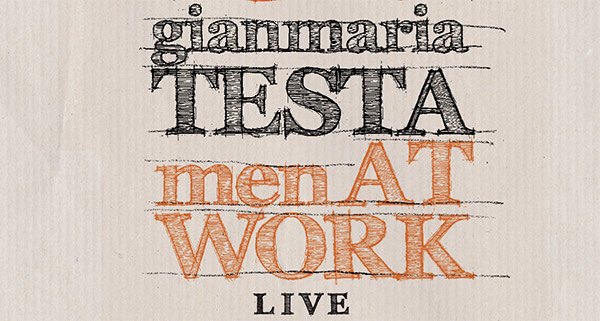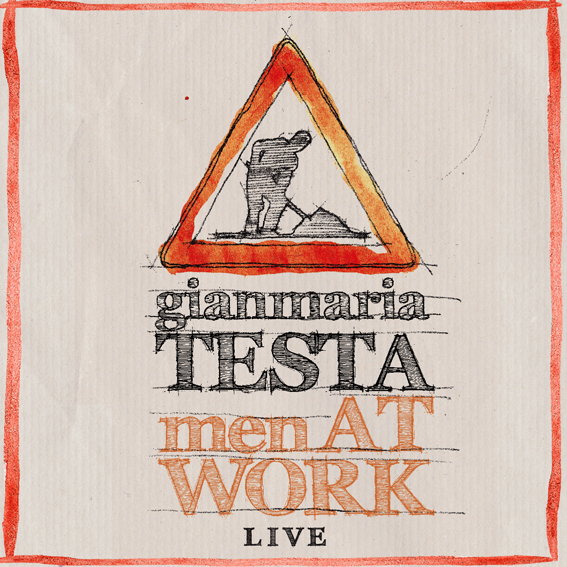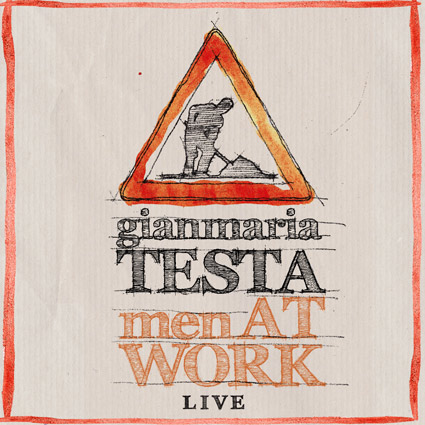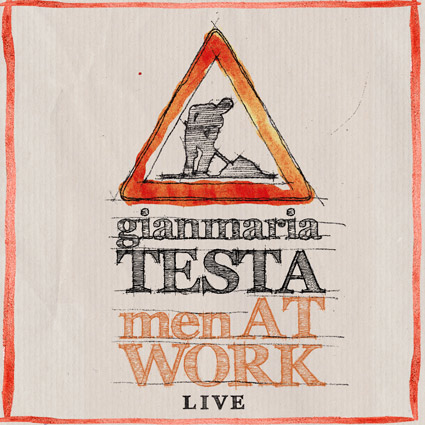

Twenty-three songs that span a twenty-year career, a two-CD live set that tells the story of a long tour in Germany undertaken with inspired musicians and kindred spirits, and a DVD of a concert at the Turin OGR (national railways repair works),where once upon a time steam locomotives were repaired...

February 2012: A long tour in Germany backed by a trio, shortly thereafter the release of VITAMIA and ten concerts in ten days. And Gianmaria Testa’s decision, made with his longtime technician Patrick Destandau, to make a recording, to leave a trace, immediately after the Zurich premiere of February 20, 2012.
And so this “live” version of VITAMIA came to be: a supple combo recording and so much more, because the set lists included reinterpretations of twenty years’ worth of songs, from LE TRAIETTORIE DELLE MONGOLFIERE (in a new and arresting arrangement), a cut from Gianmaria Testa’s début album, to the songs on the theme of modern migrations from DA QUESTA PARTE DEL MARE (winner of the 2007 Premio Tenco). And there’s even an unreleased song: Gianmaria’s solo cover of Fabrizio De Andrè and Massimo Bubola’s Hotel Supramonte: no-frills, intimate, and moving.
Nine concerts were recorded in February 2013 along with three others in Austria (Sankt Pölten and Graz) and Luxembourg, recorded exactly one year later, February 20 – 22, 2013.
Roberto Barillari mixed the recording in Carlo Miori’s studio in Bruino between April and May 2013 under the supervision of Paola Farinetti and Gianmaria Tetsa. Maurizio Biancani mastered the recording at Bologna’s Fonoprint studio in late June and early July 2013. Paola Farinetti produced the recording, which is distributed by Harmonia Mundi – Le Chant du Monde.
The two CDs also offer a chance to rediscover songs from such albums as “Montgolfières,” “Altre latitudini,” and “Extra-muros,” which are currently out of print.
The title Men at Work conjures up visions of highways and of the “work-in -progress” signs scattered along Germany’s autobahns, but also the theme of work—most often, work denied or lost—that is an overarching concern in VITAMIA (for example, in the songs Cordiali saluti and Sottosopra).
The three superb musicians who accompany Gianmaria are also friends and fellow travellers who have invented a new language, a combination of Italian, French, Spanish, and English. They’re three “men at work” alongside the fourth member of the brigade, Gianmaria. Giancarlo Bianchetti is a virtuoso who plays all guitars with singular flair. Nicola Negrini moves with nonchalance from double bass to bass guitar and even bass ukulele. Philippe Garcia, the group’s French Spaniard, is an ace on drums and a dream on glockenspiel.
While the CD was being produced, the opportunity arose to include a DVD thanks to the collaboration of the Cantieri OGR di Torino (Turin’s National Railways Repair Yards). Gianmaria—greatly moved, as befits a former railway worker—gave a concert there on July 3, 2013, which SKY Arte filmed as a special broadcast. The DVD contains most (but not all) of the songs from the two CDs and a few others not from the CDs, such as “20 mila Leghe (in fondo al mare)” and “L’automobile.” Duccio Cimatti directed the DVD.

There’s no longer a customhouse in Brennero, but the border remains. The Alps are more of a barrier than the various treatises dictate. And we also have borders inside ourselves, each one his or her own, in the kilometers that go by under the wheels of the minivans that take us around. Patrick speaks English with the others and French with me. (I don’t know English.) Philippe answers him in English but practices his colorful Spanish-tinged Italian with us. Nicola and Giancarlo speak with the lilt of Emilia and Romagna even when grappling with foreign languages, while I can never manage to hold back a word or two of Piedmont’s dialect. When we’re rehearsing at our concert venues, the local technicians give us funny looks. I have the impression they’re thinking of Babel. But we know that’s not the case. Our many wanderings have given us the gift of a language, strange, and shared, that is music even before it’s played. We pass through Brennero without stopping for customs. Each one of us with his open border within.
Gianmaria Testa
Song isn’t only sound. It’s also a perfume—light, beguiling, sometimes even obsessive. Its poetic alchemy springs above all from the intimate truths of the person singing; it grows stronger when it begins to vibrate against the air, bursting into flame when it comes into contact with the world without, feeding on the energy of those who listen. Great voices—the ones that get under our skin and never leave us—aren’t the ones that assault us with their technical prowess. Instead, they’re the ones that when scaled down to just the right degree of humanity bear witness to the secret journey from the depths of the soul in which they were born to the vast world that receives them. Such is the voice of Gianmaria Testa. In the delicate combination of chanson, jazz, Latin and rock sounds that underpins his voice, it sends forth its own unique and poignant perfume in which the unexpected and the surprising commingle with the familiar. Hearing it for the first time, and hearing the melodies and lyrics that it puts forth, gives rise to an unusual experience: a discovery with the flavor of déja vu. Even if you’ve never encountered it before, it’s one of those voices you recognize right away: the same way you recognize the voice of an unknown brother whom you’ve been waiting for, a brother whom you no longer even dared hope to find and who suddenly gives you the sweet and intense surprise of appearing and existing. Let’s think back to our first encounters with Leonard Cohen, Paco Ibañez, Roberto Murolo, Léo Ferré and João Gilberto. Let’s recall how their plain-spoken sincerity, without filters or artifice, of a nearly brutal beauty, almost literally embraced us. And recall how those voices showed us that there is no gift more generous and no stance better than simply and stubbornly being oneself. In his own way Gianmaria Testa carries on this tradition: in his voice you can hear at a distance—but also very close at hand—the traditions of hospitality and of warm welcomes that the farmers in his native Piedmont offer to visitors and to vagabonds passing through.
RICHARD ROBERT*
* Richard Robert, giornalista francese, è stato dal 1993 al 2009 critico e inviato musicale per la rivista “Les inrockuptibles. Ha creato nel 2011 il sito “L’Oreille Absolue”, dedicato alla musica e composto da lunghe interviste, articoli di fondo e sessioni inedite. Dopo aver collaborato al festival di Rennes “Les Tombées de la Nuit”, è dal 2012 consigliere artistico e assistente alla programmazione musicale del Festival “Les Nuits de Fourvière” di Lyon.
SPECIFICHE TECNICHE
Produzione: Paola Farinetti – Produzioni Fuorivia
Pre-produzione artistica: Paola Farinetti e Gianmaria Testa
Registrato: febbraio 2012 e febbraio 2013 by Patrick Destandeau
Mixato presso: ONLY STUDIO di Carlo Miori, BRUINO (Italia) by Roberto Barillari (aprile/maggio 2013)
Mastering presso: Fonoprint, Bologna (Italia) by Maurizio Biancani – assistente di studio Roberto Bartilucci (giugno/luglio 2013)
Progetto grafico: Danilo Manassero
CONCERTI REGISTRATI
11 febbraio 2012 Köln (D) – Gloria Theater
12 febbraio 2012 Karlsruhe (D) – Tollhaus
13 febbraio 2012 Nürnberg (D) – Tafelhalle
14 febbraio 2012 Bremen (D) – Kulturzentrum Schlachthof
15 febbraio 2012 Hannover (D) – Kultur- & Kommunikationszentrum Pavillon
16 febbraio 2012 Dortmund (D) – Konzerthaus Dortmund
17 febbraio 2012 Hamburg (D) – Fabrik
18 febbraio 2012 Berlin (D) – Babylon
19 febbraio 2012 Dresden (D) – Staatsschauspiel Dresden
20 febbraio 2012 Frankfurt (D) – Alte Oper
20 febbraio 2013 – Luxembourg (LUX) – Philharmonie Luxembourg – Grand Auditorium
21 febbraio 2013 – St. Pölten (A) – Festspielhaus St. Pölten
22 febbraio 2013 – Graz (A) – Orpheum Graz

14 Ottobre 2013n° 2° CD
CD 1
| Brano | Titolo | Durata | |
|---|---|---|---|
| 1 | Le Traiettorie Delle Mongolfiere | Brano e testo | 5:44 |
| 2 | Nuovo | Brano e testo | 4:07 |
| 3 | Dimestichezza D’Amor | Brano e testo |
3:30 |
| 4 | Lele | Brano e testo | 6:35 |
| 5 | Cordiali saluti | Brano e testo | 5:08 |
| 6 | Aquadub | Brano e testo | 2:06 |
| 7 | Sottosopra | Brano e testo | 3:49 |
| 8 | 18 Mila Giorni | Brano e testo | 4:26 |
| 9 | Polvere Di Gesso | Brano e testo | 5:03 |
| 10 | Preferisco Così | Brano e testo | 4:06 |
| 11 | La giostra | Brano e testo | 3:35 |

14 Ottobre 2013
Produzioni Fuorivia/Egea/Harmonia Mundi
n° 2° CD
CD 2
| Brano | Titolo | Durata | |
|---|---|---|---|
| 1 | Hotel Supramonte | Brano e testo |
5:30 |
| 2 | Lasciami Andare | Brano e testo | 4:49 |
| 3 | 3 /4 | Brano e testo |
5:23 |
| 4 | Seminatori Di Grano | Brano e testo | 4:15 |
| 5 | Ritals | Brano e testo | 5:18 |
| 6 | Come Le Onde Del Mare | Brano e testo | 2:33 |
| 7 | Le Donne Nelle Stazioni | Brano e testo | 3:39 |
| 8 | Voce Da Combattimento | Brano e testo | 4:10 |
| 9 | Nient’altro Che Fiori | Brano e testo | 4:52 |
| 10 | Al Mercato Di Porta Palazzo | Brano e testo | 5:38 |
| 11 | Come Al Cielo Gli Aeroplani | Brano e testo | 4:16 |
| 12 | La Ca Sla Colin-A | Brano e testo | 5:44 |
PER OGNI ALTRA INFO:
www.gianmariatesta.com
PRODUZIONE E MANAGEMENT
Produzioni Fuorivia – Alba – ITALIA
info@produzionifuorivia.it
www.produzionifuorivia.it
tel. +39 0173 366549
UFFICIO STAMPA – Carta Stampata
Cocchi Ballaira
laschicas@adfarm.it
cocchi.ballaira@adfarm.it
tel: + 335 6831591
UFFICIO STAMPA – Radio TV
Silvia Valderrama
EGEA Music
silvia@egeamusic.com
Tel: 0175 217323 – Int. 54
Cell: 338 6135810
UFFICIO STAMPA – web
Luigi Vignando
VignaPR & Communication
luigi@vignapr.it
tel. +39 340 3731626
Dentro l'acqua di questo torrente
così limpida e veloce scenderò
fino a quando la mia montagna
fino a dove questa montagna
si farà pianura
molto lontano da questo cielo
così vicino che lo puoi toccare
fino al punto esatto
fino al punto dove
il fiume accarezza il mare
Ma chissà
dove il fiume incontra il mare
Tutte le stelle di questa montagna
così piccole e vicine saluterò
fino a quando dalla pianura
fino a quando non potranno
più sentire
e sarò lontano da questo cielo
così lontano da non poterci tornare
molto vicino al punto
al punto esatto dove
il fiume accarezza il mare
Molto vicino al punto
molto vicino a dove
il fiume incontra il mare
Ma chissà
dove il fiume incontra il mare